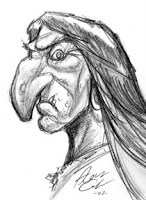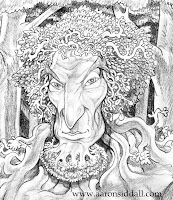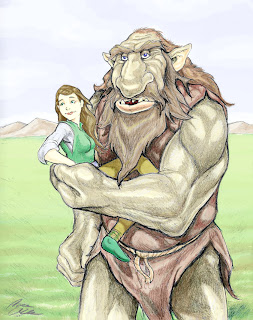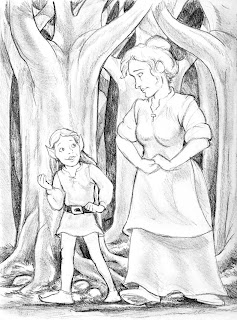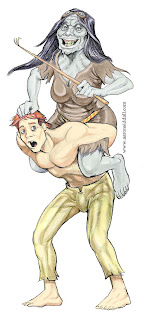Written By Daniel Hood
Illustrated By Aaron Siddall

Sitting at the dinner table on Christmas Eve, John O'Brien realized that, while he had rehearsed countless scenarios to deal with the innumerable crises entailed in rearing children, he had never considered this one.
"It's not his real birthday, you know," his son Sean went on, with all the insufferable wisdom of 14. "He was born some time in the spring - probably around Easter."
"Sean," O'Brien warned, "I think that's enough."
The boy did not take the hint. O'Brien loved him, certainly, and took a certain pride in his intelligence, but his son's habit of announcing the facts he had just learned as if they were startling new discoveries had begun to annoy him. Particularly when they affected Bunny.
Sean's sister stared skeptically across the table. She had been born on Easter, eight years before (hence Bunny, though her given name was Virginia), and that probably explained why she did not reject the idea out of hand. She turned instead to her father.
"But if he was born on Easter, why do we have his birthday in November?"
O'Brien knew the answer, but he fumbled for a second, throwing a glance for help to his wife. She hid a smile behind her hand, and Sean took the opening.
"Because, Virginia, the early Christians took over an old pagan holiday, to make their religion more attractive to the heathens."
"They can't do that," Bunny said, as though it were obvious. "You have to celebrate someone's birthday on their birthday." Again, she turned to her father, who was still thinking that Sean's answer sounded like it came right out of a textbook, and wondering when the boy had started using his sister's proper name, instead of the nickname everyone else used.
Just like him, O'Brien was thinking. Why can't he be a drug addict, like other kids, instead of a junior professor? A boring junior professor.
Virginia's comment caught him short, but his wife came to his rescue.
"Well, Bun," Debbie said, "think of it this way: if we had Christmas on the same day as his birthday, then he would only get one set of presents, right? And that wouldn't be fair, would it?"
Sean snorted, dropping his fork and placing both hands on the tablecloth in preparation of a stunning revelation that would sweep away this silliness.
O'Brien cut him off. "You finished, Sean?"
"Huh?"
"Good. It's our turn to do the dishes. Come on."
The boy obeyed immediately, and O'Brien felt a twinge of guilt. He loved his son - why couldn't he like him, too?
As they gathered up the remains of Christmas Eve dinner and took them from the dining room to the kitchen, Bunny asked her mother: "But if Christmas wasn't on his birthday when he was born, did Nick have to bring him presents?"
* * *
" 'Did Nick have to bring him presents,' " Sean said in the kitchen, scraping turkey and mashed potatoes into the garbage. He was small and dark, like his father. "Did you hear that? She still believes Old Nick comes out of the fireplace on Christmas Eve."
Maybe that's part of it, O'Brien realized. He looks so much like me when I was his age, and I didn't like myself then much. A small wave of self-disgust broke over him even then, standing by the sink and rinsing the dishes Sean handed him. He's a good boy, a good son. You should be proud of him. And you are. Still....
"So what's wrong with that?" he asked, succeeding in sounding reasonable. "She believes it. It's a nice thing to believe - that there's a God, and that he sent his son down to us. What's wrong with that?"
"Oh come on, Dad. That's not what she really believes in. She believes that there's a goblin who brings presents to all the good little boys and girls, and punishes the bad ones."
It was a fine distinction, and O'Brien, in his self-enforced generous mood, recognized it. He thought, too, that he might turn it to his advantage, might use it to help teach Sean a little wisdom to leaven all his knowledge. "OK, maybe she does. But that's good too - it's good that people should believe that innocence is rewarded, and that bad people get punished. Even if it doesn't happen in real life," he added quickly, "it's a good principle to believe in."
Sean accepted this thoughtfully, pausing in his chores, and winning a little more respect from his father. "I guess so. But still - the devil. I mean, do you believe in the devil?"
"I believe in evil," O'Brien said.
"Yeah, but with a small e or a capital E? I mean, do you believe that on the night he was born, Jesus went down into hell and fought the devil and freed all the souls that had gone there before he was born? And that because of that, Old Nick has to come out on Christmas Eve and bring presents to good people and switches and sulfur and brimstone to bad people?"
O'Brien pursed his lips and blew, a gesture of uncertainty. "No," he said at last, and slowly. "I guess I don't. I believe in God, but I'm not sure about the details. I think it's probably more of an allegory - a nice idea told in a nice way."
"Like advertising," Sean said. "That's all it is, anyway. I mean, they could have chosen any pagan holiday - why November 1? Because it would be attractive to the pagans. And why presents and stuff? Because it kept the common people in the Middle Ages happy. Why a harvest holiday? Why not a mid-winter holiday, or a spring holiday?" He was slipping again into textbook-mode.
"I know, I know," O'Brien said. "I know the 'pagans' thought about death on October 31, so the church chose that day to celebrate Christ's victory over death. You know that, and I know that. So we can be nice and skeptical about it, and just take Christmas as a time to get presents. But Bunny doesn't know it, and there's magic in that, Sean. It's good magic, and you should be a little more careful about it. It's for her to decide when she wants to start thinking like that. So lay off a little, will you? Let her think Old Nick brings her her presents, instead of me and your mother. OK?"
To his relief, Sean shrugged and then nodded. "Sure. Why not?"
"Good. Get the dessert out of the fridge, will you?"
Once again, the boy did as he was told, and O'Brien was grateful for the respite. The conversation had made him uncomfortable, not because he had had to defend Bunny's innocence from Sean's skepticism, but because, to a certain extent, he had been defending his own innocence.
A part of him - The pagan part, he guessed - wanted to believe the things Bunny believed. That God's son had been born not in the spring, but in some ancient autumn, with cold October winds howling around the manger. That it had not been a marketing gimmick to attract the heathen Celts and polytheistic Romans, but a matter of fact. That Old Nick really had been compelled to rejudge all souls, and bring rewards to the good.
He was uncomfortable defending these thoughts to Sean, because it reversed their positions. It made him the gullible child, and Sean the smart, practical adult. And it left him a little ashamed that a small part of his heart still clung to the simple faiths of childhood.
"You want your apple pie heated?" Sean asked. "I'll nuke it."
God, he's considerate, O'Brien thought. He's a good, good, good boy. I'll be nicer to him.
"Yeah, thanks. Better ask your mother and sister, too."
* * *
Later, they sat in the living room. There were masquerade parties in the neighborhood, but he and his wife had decided to spend the evening with the children.
Debbie and Sean were watching an old black-and-white version of A Christmas Carol. O'Brien distracted Virginia, because he didn't like that particular version; when he was five the scene of Nick trying to buy Scrooge's soul in that creepy old mansion had given him nightmares.
So he held her in his lap and read her a Christmas story, carefully holding the illustrated book up to block the view of the TV.
"...the doors were locked tight, and so were the shutters;
But the sound of his claws brought to all their hearts flutters.
They knew even then, as the fire burned low,
That Old Nick was about, his eyes all a-glow."
This isn't much better than the TV, O'Brien thought, but a quick glance at his daughter's face showed that she was all right: she followed his reading with one tiny hand, her finger occasionally straying to the comical pictures of Old Nick, at which she giggled.
"Daddy," she said suddenly, looking up at him with a strangely adult expression of purpose, "I want to stay up and see him."
Sean threw him a quick look, an I-told-you-so glance, but it softened into a smile and he turned back to the TV. O'Brien had to give him credit - since their talk in the kitchen, his son had shown no inclination to slip back into textbook-mode.
"I don't think you should do that, darling. He's a mean old goblin, and he doesn't like being seen."
"He might decide to leave you sulfur and brimstone," Sean said suddenly. "You don't want that, do you?"
"I'm not going to get that," Bunny pronounced, squirming in O'Brien's lap to face her brother. "I've been good. I don't see why I can't see him."
"I don't know, Virginia," he said, "but if you want sulfur and brimstone, I don't care. I'd stay away from him."
"Listen to your brother," Debbie said. "He's smart."
"Yeah," O'Brien agreed. "Listen to your brother."
Concerted opposition distressed the little girl. "He wouldn't leave me bad things just because I wanted to see him, would he?"
"Never know," Sean warned offhandedly. "He might just decide to grab you and take you away."
"He wouldn't! I've been good!"
"No, he wouldn't," O'Brien soothed, "but why take any chances? You know what he looks like - why would you want to meet him in person? I hear he's even uglier in person. So you should sleep the whole night through, and only come downstairs when he's gone and it's safe."
"Huh," she said, and nothing more.
What kid in their right mind, O'Brien wondered a moment later, would want to see Old Nick? I never did.
* * *
O'Brien turned off the light by Bunny's bed and, as if this were the cue she had been waiting for, she caught his hand and made him sit down. The light from the hall filtered in through the doorway, lighting a path to her closet but leaving the bed in darkness. Outside her window, the red and orange Christmas lights flickered on and off, on and off.
"Dad," she whispered, "did you put out the garlic?"
"Not yet, honey, but I will before I go to bed."
"Promise?"
"I promise."
She squeezed his hand. "And you put the screen on the fireplace?"
"I will."
"So Nick can't get in."
"Right. Don't you worry, he won't. He'll leave your presents, if you've been good. Have you been good?"
In the dimness, he could not be sure, but it seemed to him then that her face assumed that look of purpose that had surprised him before. "Oh, he won't hurt me. I've been good."
"Good." He paused, then bent down and kissed her forehead. "Merry Christmas, Bun."
He stood, but she would not let go of his hand. "Dad, do you believe in Old Nick?"
"Of course I do. Why wouldn't I?"
"I believe in him."
He kissed her again. "As well you should, sweetie. It'll keep you good. Now go to sleep."
"I believe," she whispered and, letting go of his hand, turned onto her stomach and put her pillow over her head.
* * *
Sean came out of the bathroom as O'Brien shut his daughter's door.
"Hey, Dad."
"Hey, kiddo. Going to bed?"
"Yeah. Is Virginia asleep?"
"Soon."
The boy smiled, but there was nothing mean about it. "Think she'll see Old Nick?" Like they were both adults, and could smile at the whims of little children. O'Brien found he did not mind this assumption of equality.
"If anyone will, she will."
"Yeah, I guess so. Good night. Merry Christmas."
"Merry Christmas, Sean," O'Brien said, and as he passed, tousled the boy's hair.
Good kid.
* * *
He and his wife were up for another hour, getting things ready for the morning. They set up the ornamental screen in front of the fireplace - theirs was wood, an antique inherited from his wife's family, pierced like a Turkish harem window with inset diamonds of glass that reflected light and twinkled like stars. Then they set up the creche, the infant and his mother inside with all the animals, the Three Kings standing guard at the door, Old Nick cowering around the corner.
When the presents were finally spread out in piles around the screen, O'Brien and his wife gave themselves a few minutes on the couch, lying comfortably in each other's arms.
"Merry Christmas," she said, and kissed him.
"And to you," he returned, and kissed her back. Debbie broke the kiss to laugh, and he smiled quizzically at her.
"What?"
"I was just thinking about being bad," she explained, with a suggestive look.
"Careful," he warned, though he was warming to the idea, "you might get sulfur and brimstone for Christmas."
"That's what Bunny would say," Debbie remarked, and kissed him again. "I say something else."
"Oh," he said suddenly, and extricated himself from her embrace. "I almost forgot the garlic."
He jogged to the kitchen and got out the plate of garlic-laced rolls from the refrigerator. When he went back to the living room, his wife was propped up on one elbow, a reproving look on her face.
"Garlic?"
"For Bunny," he explained, carefully stepping over the creche to deposit the plate behind the screen. Then he returned to the couch and lay down next to her. "C'mon, darlin', didn't you like that stuff when you were a kid?"
"I'm not a kid anymore; I like other stuff now. Let's go upstairs - I don't want Old Nick spying on us."
* * *
Both O'Brien and his wife slept heavily afterward, but an hour or so before dawn he woke and shuffled quickly, still half-asleep to the bathroom. As he came back, Sean appeared at the door of his room, rubbing his eyes.
"Dad, did you hear something?"
"Just me in the can, kiddo. Go back to sleep."
"No, something else. From downstairs."
A red glow seeped through Virginia's open door. He had forgotten to turn off the lights.
Why's her door open?
Then they both heard the hiss.
Sean jumped down the stairs two at a time, his father right behind him, and then they both froze in the entrance to the living room.
"I knew you'd come," Virginia was saying, talking to the creature behind the screen.
"Yesss, Virginia. I came. But why thisss garlic? And thisssscreen? I have thingss for you, my dear. Come clossssser."
The figure behind the screen pranced anxiously, its cloven hoofs clicking on the hearth. A red sack lay open by its side.
"Dad - " Sean began.
"Honey," O'Brien called to his daughter. "Come here."
"Dad - "
"No!" the thing in the fireplace said, and poked its head over the screen.
"Holy shit," Sean breathed, and fainted.
"Dad, I told you he'd come!"
"Yes, Virginia, now come here."
"Come here, Virginia," the creature said, beckoning with one long-nailed finger. "I have goodiessss for you."
"Virginia," O'Brien said, as sternly as he could manage. "Come here!"
With a shrug and a look of casual apology, she turned from Old Nick and went to her father. "I told you he'd come."
"Yes dear," he said shakily, and when she was safely behind him, took a step toward the fireplace. He wanted a poker, but they were all too near the creature.
However, even as he stepped forward, the creature hissed its disappointment, laid a finger alongside of its warty nose, and disappeared into the cracks of the fireplace.
O'Brien took a deep breath - the deepest he had ever taken.
"Hey, Dad, look at this! Sean fainted! What a baby!"
It took a wet towel to bring the boy around, and the first thing he did was throw his arms around his father and hug him fiercely, which O'Brien decided he liked.
"Oh, jeez," Sean said, "why didn't they choose a different day?"
* * *
"Well," Debbie O'Brien said the next morning, on finding not just her husband but her two children in bed with her. "Isn't this Christmasy?"
THE END
